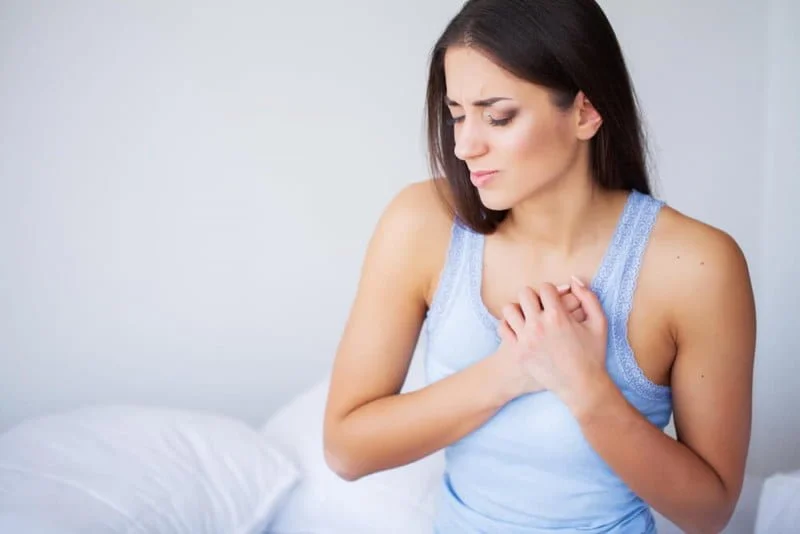Welcome to a transformative phase of a woman’s life—perimenopause. As hormonal fluctuations take center stage, many women find themselves facing a myriad of symptoms, one of the most common being sore breasts. The discomfort and tenderness can be physical and emotional, impacting daily life. Fear not, for this blog, is your guide to understanding, managing, and finding sore breasts perimenopause treatments. Let’s journey to reclaim comfort and confidence in this transitional period.
Contents
Why Do Breasts Hurt During Perimenopause?
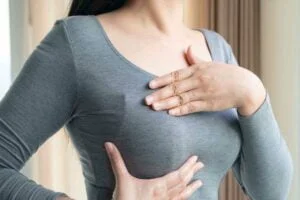 Breast pain, tenderness, or discomfort during perimenopause can be attributed to hormonal changes that occur as a woman’s body transitions towards menopause. Perimenopause is the transitional phase leading up to menopause, marked by fluctuations in hormone levels, primarily estrogen and progesterone. The reasons behind breast pain during perimenopause include:
Breast pain, tenderness, or discomfort during perimenopause can be attributed to hormonal changes that occur as a woman’s body transitions towards menopause. Perimenopause is the transitional phase leading up to menopause, marked by fluctuations in hormone levels, primarily estrogen and progesterone. The reasons behind breast pain during perimenopause include:
- Hormonal Fluctuations: Estrogen and progesterone play crucial roles in regulating the menstrual cycle and maintaining breast tissue. During perimenopause, these hormones undergo significant fluctuations as the ovaries gradually reduce their hormone production. The imbalance in estrogen and progesterone levels can lead to breast tissue sensitivity and pain.
- Increased Sensitivity of Breast Tissue: As hormonal changes affect breast tissue, it becomes more sensitive to hormonal fluctuations. This heightened sensitivity can result in increased tenderness and discomfort.
- Changes in Breast Tissue Composition: Estrogen influences the density and composition of breast tissue. As estrogen levels decline during perimenopause, changes in breast tissue, including increased fibrous tissue, may occur. These alterations can contribute to breast pain and tenderness.
- Fluid Retention: Hormonal shifts can also lead to fluid retention in the breast tissue, causing swelling and discomfort. This fluid retention is often associated with changes in estrogen and its effects on the body’s fluid balance.
- Stress and Lifestyle Factors: Perimenopause is a time of increased stress for many women, and stress can exacerbate physical symptoms, including breast pain. Additionally, lifestyle factors such as diet, exercise, and overall well-being can influence hormonal balance and breast health.
- Cyclic Nature of Hormonal Changes: The cyclical nature of perimenopausal hormonal fluctuations can result in cyclic breast pain, similar to the cyclical breast discomfort experienced during the menstrual cycle. Some women may notice that breast pain is more pronounced during certain phases of their menstrual cycle.
It’s essential to note that while breast pain during perimenopause is often associated with hormonal changes, any new or persistent breast symptoms should be evaluated by a healthcare professional. They will help to rule out other potential causes and ensure optimal breast health.
What Are Some Effective Sore Breasts Perimenopause Treatments?
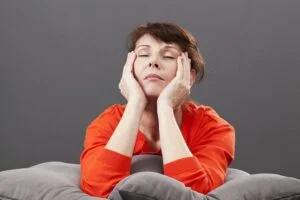 Sore breasts perimenopause treatments involve a combination of lifestyle adjustments, self-care practices, and, in some cases, medical interventions. Here are some effective sore breasts perimenopause treatments to help:
Sore breasts perimenopause treatments involve a combination of lifestyle adjustments, self-care practices, and, in some cases, medical interventions. Here are some effective sore breasts perimenopause treatments to help:
Supportive Bras
Wearing a well-fitting and supportive bra is paramount for managing sore breasts during perimenopause. Opt for bras with proper coverage and wide straps to provide adequate support. A supportive bra can help distribute the weight of the breasts more evenly, reducing strain on the breast tissue. Consider sports bras or those designed specifically for high-impact activities, as they often offer additional support.
Dietary Modifications
Making thoughtful adjustments to your diet can play a role in mitigating breast tenderness. One significant consideration is to limit caffeine intake, found in coffee, tea, and chocolate, as it may contribute to hormonal fluctuations that exacerbate breast discomfort. Additionally, incorporating foods rich in omega-3 fatty acids, such as fatty fish (like salmon) and flaxseeds, can provide anti-inflammatory benefits, potentially alleviating breast pain.
Hydration
Adequate hydration is crucial for overall health and can help manage fluid retention, which may contribute to breast swelling and discomfort. Ensure you drink enough water throughout the day, as maintaining proper hydration can positively impact your body’s fluid balance and potentially reduce breast soreness.
Heat or Cold Therapy
Applying heat or cold to sore breasts can be a simple yet effective way to find relief. A warm compress or a warm bath can help relax breast tissue, alleviate tension, and improve blood circulation. On the other hand, cold packs can reduce inflammation and numb the area, providing a soothing sensation. Experiment with both approaches to see which works best for you.
Over-the-Counter Pain Relievers
Non-prescription pain relievers, such as ibuprofen or acetaminophen, can be valuable tools for managing perimenopausal breast pain. These medications have anti-inflammatory and pain-relieving properties, helping to reduce discomfort. However, it’s important to use them as directed and consult with a healthcare professional, especially if considering regular or prolonged use.
Regular Exercise
Engaging in regular physical activity is beneficial for managing perimenopausal symptoms, including sore breasts. Exercise helps regulate hormonal balance, reduce stress, and improve overall well-being. Activities like walking, swimming, or yoga not only promote physical health but also contribute to emotional and mental resilience, potentially alleviating breast tenderness. Aim for at least 150 minutes of moderate-intensity exercise per week to experience the positive effects on hormonal fluctuations and overall health.
Stress Reduction Techniques
Chronic stress can exacerbate perimenopausal symptoms, including breast pain. Incorporating stress reduction techniques into your routine, such as deep breathing, meditation, or yoga, can have a profound impact on both emotional and physical well-being. These practices help to lower stress hormones and promote a sense of calm, potentially reducing the intensity and frequency of sore breasts.
Herbal Supplements
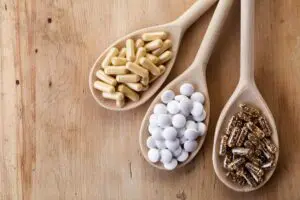 Some women find relief from perimenopausal symptoms, including breast tenderness, through herbal supplements. Evening primrose oil, for example, contains gamma-linolenic acid, which may help balance hormones. Chasteberry is another herb thought to influence hormonal activity. While some women report positive effects, it’s crucial to consult with a healthcare provider before incorporating herbal supplements into your routine, as they may interact with other medications or have unintended effects.
Some women find relief from perimenopausal symptoms, including breast tenderness, through herbal supplements. Evening primrose oil, for example, contains gamma-linolenic acid, which may help balance hormones. Chasteberry is another herb thought to influence hormonal activity. While some women report positive effects, it’s crucial to consult with a healthcare provider before incorporating herbal supplements into your routine, as they may interact with other medications or have unintended effects.
Hormone Replacement Therapy (HRT)
In cases where perimenopausal symptoms, including breast pain, are severe, hormone replacement therapy (HRT) may be considered. HRT involves supplementing the body with estrogen or a combination of estrogen and progesterone to balance hormonal levels. While effective in alleviating symptoms, HRT carries potential risks, and its use should be carefully discussed with a healthcare provider to weigh the benefits and risks based on individual health history and needs.
Regular Breast Self-Exams
Regular breast self-exams are essential for monitoring changes in breast tissue and detecting any abnormalities early on. Familiarize yourself with the normal texture and appearance of your breasts, and perform self-exams regularly. If you notice any persistent changes, lumps, or unusual symptoms, promptly consult with a healthcare professional for further evaluation.
Consultation with a Healthcare Provider
Seeking guidance from a healthcare provider is crucial for developing a personalized and effective plan to manage sore breasts during perimenopause. If symptoms persist or are accompanied by other concerning signs, such as nipple discharge or changes in breast appearance, a comprehensive evaluation is necessary. A healthcare professional can recommend appropriate interventions, including diagnostic tests and treatment options tailored to individual needs.
Incorporating these strategies into your perimenopausal care routine can contribute to a comprehensive approach to managing sore breasts. However, individual experiences vary, and consulting with a healthcare provider ensures that your approach is tailored to your unique health profile and addresses any specific concerns or underlying conditions.
What Vitamins Are Good For Sore Breasts Perimenopause?
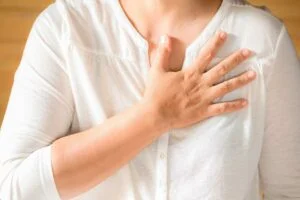 Several vitamins and minerals play a role in maintaining breast health and may contribute to alleviating sore breasts during perimenopause. However, it’s important to consult with a healthcare provider before adding any supplements, as excessive amounts of certain vitamins can have adverse effects. Here are some vitamins that are often considered:
Several vitamins and minerals play a role in maintaining breast health and may contribute to alleviating sore breasts during perimenopause. However, it’s important to consult with a healthcare provider before adding any supplements, as excessive amounts of certain vitamins can have adverse effects. Here are some vitamins that are often considered:
- Vitamin E
Known for its antioxidant properties, vitamin E may help reduce inflammation and breast tenderness. It’s found in nuts, seeds, spinach, and broccoli. Consider incorporating these foods into your diet or consult with your healthcare provider about vitamin E supplements.
- Vitamin B6 (Pyridoxine)
Vitamin B6 is involved in hormonal regulation and may help alleviate breast pain. Good dietary sources include poultry, fish, bananas, and fortified cereals. If considering supplements, consult with a healthcare provider to determine the appropriate dosage.
- Vitamin D
Vitamin D is crucial for overall health, and some studies suggest it may have a role in breast health. Natural sources include sunlight, fatty fish, and fortified dairy products. If vitamin D levels are low, supplements may be recommended under the guidance of a healthcare provider.
- Vitamin C
With its anti-inflammatory properties, vitamin C may help reduce breast pain. Citrus fruits, strawberries, bell peppers, and broccoli are excellent sources. Including these foods in your diet may contribute to overall breast health.
- Calcium
Calcium is essential for bone health and may also have a role in breast health. Dairy products, leafy greens, and fortified plant-based milk are good dietary sources. Adequate calcium intake is important. However, excessive supplementation may have risks, so it’s advisable to consult with a healthcare provider.
- Magnesium
Magnesium is involved in muscle function and may help relax breast tissue. Nuts, seeds, whole grains, and leafy greens are good dietary sources. If considering magnesium supplements, consult with a healthcare provider to determine the appropriate dosage.
It’s important to emphasize that obtaining nutrients through a balanced diet is generally preferable to relying solely on supplements. Dietary changes should be discussed with a healthcare provider to ensure they align with individual health needs and potential interactions with medications or existing health conditions.
Conclusion
In conclusion, sore breasts during perimenopause treatments is a multi-faceted journey that involves understanding, self-care, and, at times, professional guidance. Hormonal fluctuations can lead to discomfort, but simple lifestyle adjustments, like wearing supportive bras and making dietary changes, can provide relief. Engaging in regular exercise, practicing stress-reduction techniques, and considering certain vitamins may contribute to overall well-being.
It’s crucial to be attuned to your body through regular self-exams and seek guidance from healthcare providers if symptoms persist or if there are concerns. Remember, every woman’s experience is unique. So finding a personalized approach that works for you is key to reclaiming comfort. If you are facing menopause-related issues, menopause treatment at HerMantra can help. Book your free trial online menopause treatment session now.
